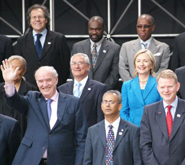AS/COA Online - Resource Guide: Brazil's Runoff Election
/Dilma Rousseff and José Serra face off October 31 in a runoff presidential election. Dilma, as she is commonly known, is popular President Luis Inácio Lula da Silva’s handpicked successor and former cabinet chief and remains the favorite in polls. Still, Serra, the former governor of São Paulo, has seen the gap ebb and flow since the first round on October 3. One of them will take office in January 2011. AS/COA Online offers an overview of polls, coverage, and primary sources as the country’s 1.36 million voters prepare to head to the polls.
Topics Covered:





